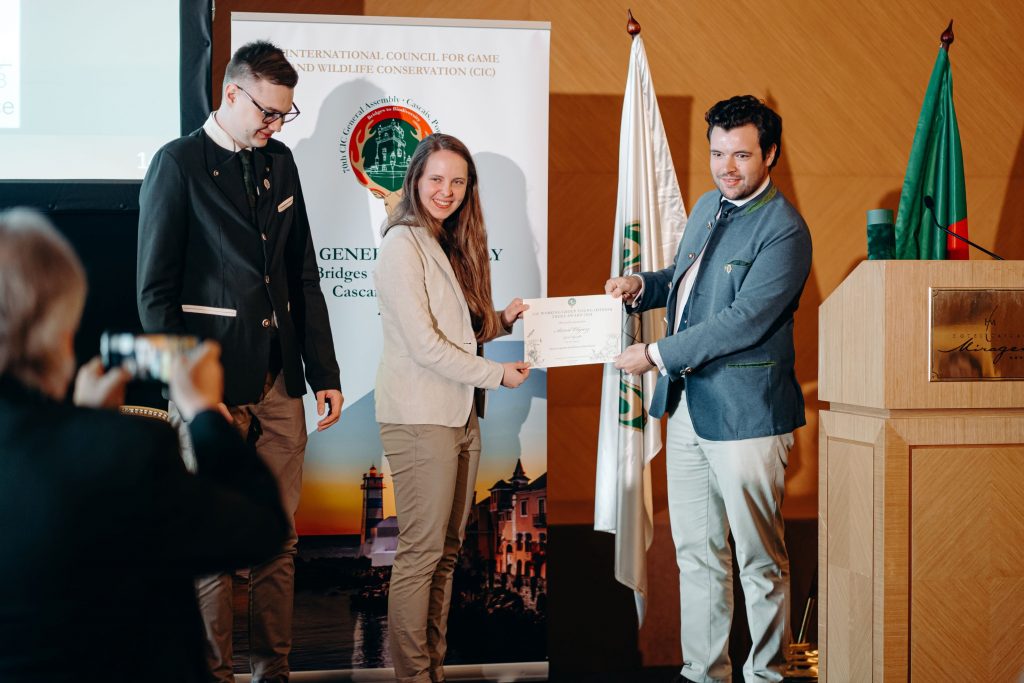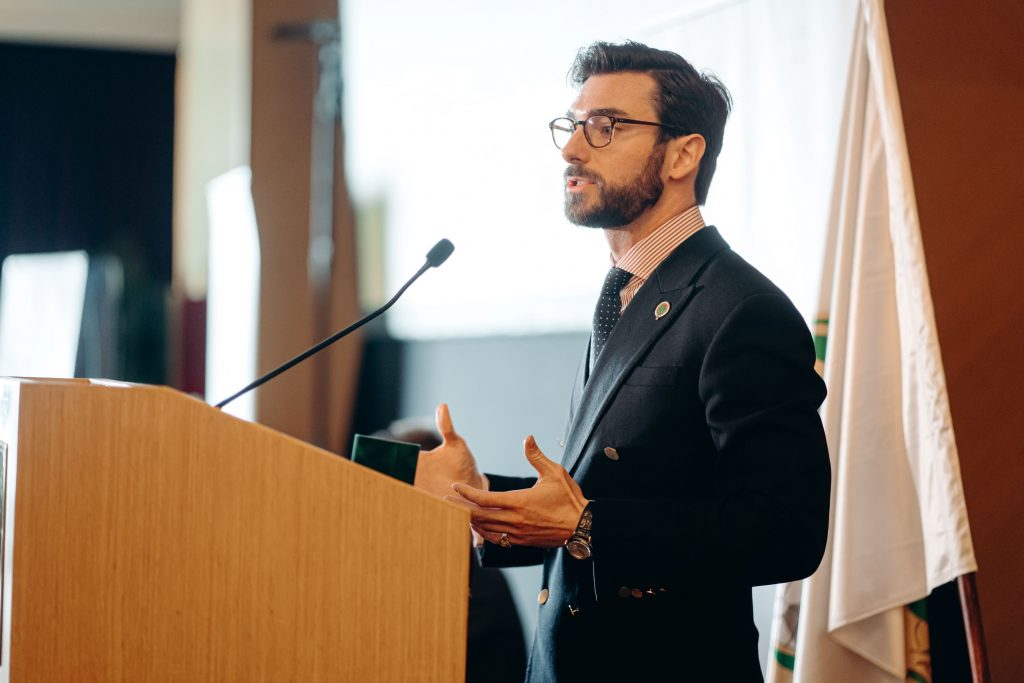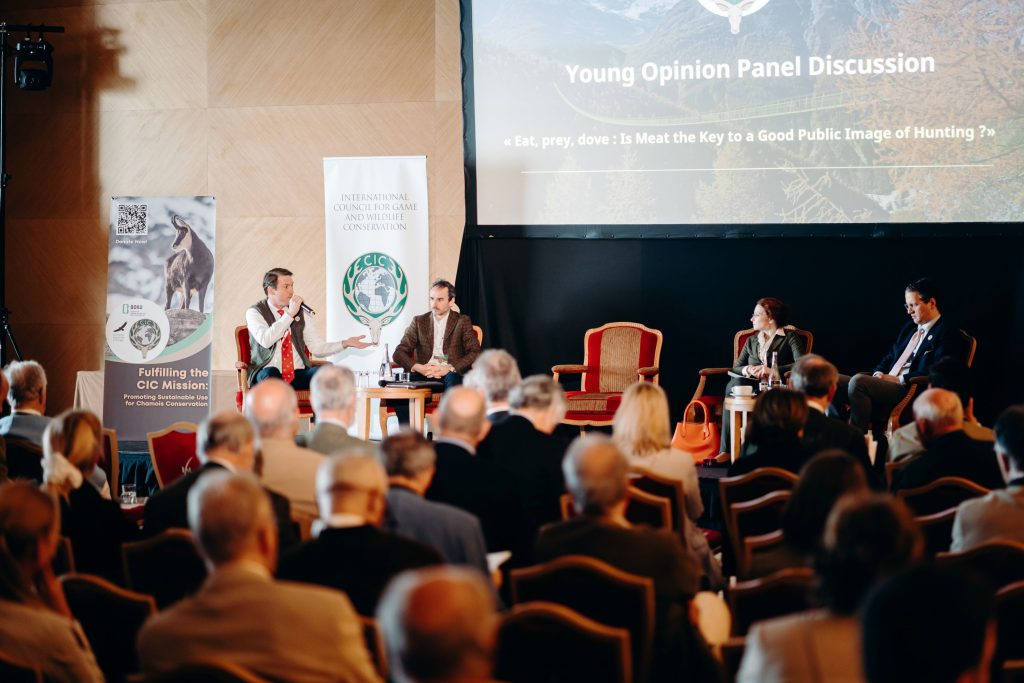Young Opinion Research Award

From left to right: Krzysztof Kowalewski (President of CIC Young Opinion Working Group), Astrid Olejarz (YO Research Award Winner) and Alexandros Karabalis (CIC Belgium Member)
Hosted every year by the Young Opinion Working Group, the Young Opinion Research Award aims to support researchers whose projects contribute to the sustainable use of wildlife resources. It recognises academic research that covers any or all of the three main pillars of sustainable wildlife management – economic, socio-cultural, ecological.
At the Young Opinion Session in Cascais, Astrid Olejarz from the Czech University of Life Sciences Prague was announced as the winner of the 2024 Young Opinion Research Award for her submission on Spatial Responses of Wild Boar to Driven Hunts.
During her speech – where she gave a presentation on the research – it was noted that human-induced environmental changes are leading to the extinction of some species, whilst others, such as the wild boar, are thriving to the point that they have been referred to as pests and invasives.
Drawing attention to controls such as indirect manipulation (fences), fertility control, and lethal controls, it was stated that hunting can lead to altered morphological traits, with her research looking into changes in behaviour.
Young Opinion Promotion Video

Lukas Hamilton Eddy, CIC Member from the UK
Lukas Hamilton Eddy (CIC Member from the UK) presented a Young Opinion Promotion Video which was filmed during a three-day hunt in France.
The video producers noted it was their mission to teach society about hunting, explaining that hunters respect nature and are there to protect it.
Eat, Prey, Dove: Is Meat the Key to a Good Public Image of Hunting

From left to right: Gerard Brodin (Head of the Swedish Delegation of the CIC), Vandrille Spire (CIC Member from France), Antje Katrin Bednarek (Veterinarian from Germany) and David Plaz (CIC Treasurer)
This panel discussion moderated by Oskar Tornvall – CIC Member from Sweden – sought to explore game meat within a wider societal context of hunting and its public image.
Gerard Brodin, Head of the Swedish Delegation of the CIC, kicked off the discussion by detailing his business operations in Sweden selling game meat to supermarkets. He described the different stages in the supply chain, including the involvement of big hunting estates, as well as the transport and preparation of the meat.
On the topic of end-consumer habits and requests, it was suggested that there was a propensity for climate-friendly, local, antibiotic-free meat, harvested using ethical slaughtering methods and containing high levels of vitamins and minerals. He also underscored a trend for ready-meals, driven by a lack of time to cook.
It was further added that hunting seasons dictate that commercial production has to be frozen rather than fresh, while noting that positioning freezers strategically within supermarkets is a way to entice consumers.
David Plaz, CIC Treasurer and a co-owner in a game meat product company that trades into Asia, cautioned about the difficulties of the sector, referencing the barriers in organisation, seasonality and hygiene requirements. He described difficulties in convincing consumers of game meat and its sub-categories, while at the same time reversing beliefs in the difficulty of cooking game. It was noted that as legislation evolves across Europe, game meat will inevitably become more processed.
Addressing the topic from a different perspective was Antje Katrin Bednarek, a veterinarian from Germany who discussed the relationship between game meat to zoonosis. She drew parallels between regulations for game meat and farm animals, highlighting that game does not have as many problems as the products from farm animals. It was noted that the German government is pushing for decreased meat consumption and promoting veganism.
Vandrille Spire, CIC Member from France, spoke about his association in France which promotes game meat with the objective of bringing together all stakeholders to communicate with one voice on public health and the environment.
He noted work conducted to create a label of trust for game meat, stating that the French market boasts 65 million consumers. All French game meat goes to export and comes back via imports in a few restaurants for Christmas and is perceived as elitist food. Problems of social acceptance were reiterated, but it was underscored that the French love their food. He drew attention to dynamic new markets and online shops that sell fresh meat directly, expressing his hope that French game meat would be kept and consumed in France on the road ahead.
